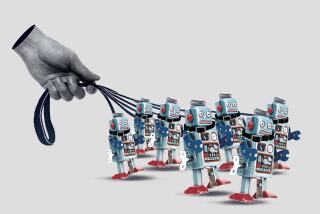Computers Could Soon Tackle Personnel Tasks
- Share via
Computers may one day take over a significant portion of job interviewing and candidate screening for businesses. In fact, job-interviewing software has already been developed.
Computer Employment Applications (CEA) is a program that uses a personal computer as the initial interviewer in the hiring process.
The applicant reads questions on the computer screen and types answers into the computer. The process is a private encounter between applicant and computer, with no interviewer present.
No computer skills are necessary for the interview, according to CEA developer Richard J. Phannenstill, who maintains, “No one has ever not been able to use this system.”
After the interview, the computer prints out a comprehensive summary of the information collected. It can be used by the employer to evaluate the applicant and to help check references.
Phannenstill points to estimates that half of all resumes or job applications are false or embellished. Employers using computerized interviewing have found applicants more truthful with computers than humans, he says.
For example, CEA-interviewed applicants were more likely to admit illegal drug use than in face-to-face interviews.
In the future, employees may find their performance reviews conducted by computer. Performance Mentor, Inc., has developed software that allows managers to profile employees, do performance appraisals and keep a record of employee development.
The hot jobs of the 1990s will be determined by factors beyond demographics and changes in the composition of the work force.
Purdue University researchers say new technologies and changing social concerns will greatly increase the need for workers in certain jobs and will create whole new categories of jobs.
Among occupations that will have the greatest demand for new workers:
- Food-science researchers, who will be in short supply as consumers demand more convenience, greater safety and higher quality in the foods they buy.
- Nuclear pharmacists, who will develop and use disease-detecting radiopharmaceuticals.
- Environmental engineers, who will respond to growing concerns about pollution and waste management.
- Biotechnology researchers, who will explore the dramatic advances that are expected to take place in genetic engineering and other biotechnology-related areas.
- Materials engineers, who will create the exotic materials that other types of engineers will need, such as ceramics, polymers, superconducting materials and high-temperature alloys.
Other jobs with good prospects for growth include health-service administrators--particularly in the area of mental health--and statisticians.
Many businesses in the United States seem willing to become “points of light” to help the disadvantaged. But over 82% of business leaders in a national survey said they believe that it is unrealistic to ask business to come up with funds to make up for government cutbacks in social service programs.
The survey, conducted by Save the Children, a community development and relief agency, indicated that more than half of business leaders believe that corporations should participate in charitable efforts.
Younger executives are particularly inclined toward charity. Sixty-nine percent of those under 50 said businesses should participate in such efforts--a positive sign for the future of business-driven charitable efforts.
However, the company owners, presidents and chief executive officers polled don’t think business should bear the burden alone.
More than half of the business leaders expect support for charities to remain at about the same level as now during the early 1990s.
A third project that charitable giving by businesses will increase in the next few years; only about 12% anticipate that giving will decrease.
Corporate sponsorship of charitable events and programs will be increasingly popular in the 1990s, as will direct corporate gifts, the business leaders added.
More to Read
Inside the business of entertainment
The Wide Shot brings you news, analysis and insights on everything from streaming wars to production — and what it all means for the future.
You may occasionally receive promotional content from the Los Angeles Times.










